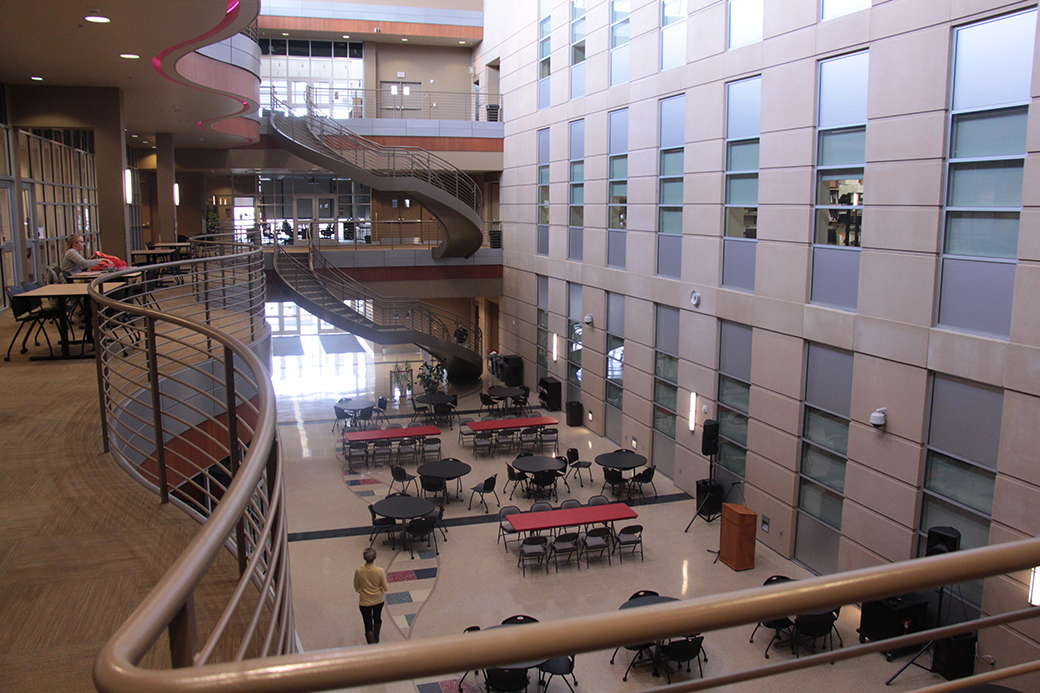
School of Medicine benefits from Onward Campaign
With $135 million of the $250 million goal already raised, the Onward Campaign has begun to improve different aspects of campus at the University of South Dakota — including the USD Sanford School of Medicine.
Mary Nettleman, dean of the Sanford School of Medicine, said by the end of the Onward Campaign, her goal is to have raised $4 million for scholarships. So far, more than $2 million has been raised in just one year.
She said it is her personal goal not to dilute scholarships by giving less money to more students.
“Student debt is a really critical thing for us,” Nettleman said. “It does two things when a donor recognizes us by endowing a scholarship. It helps out financially with students (and) it also shows the students that the alumni believe in them. They think they’re doing good things and they’re moving forward — it gives everybody a boost.”
The School of Medicine was in the 26th percentile for tuition costs nationwide, but in the 40th percentile for student debt, Nettleman said.
Fourth-year med student Marnie Schuneman has received several USD and other South Dakota-based scholarships, including a Presidential Alumni Scholarship, and conditional acceptance into USD’s med school as a senior in high school through the Medical Alumni Student Scholars Program.
“I’ve really been blessed,” Schuneman said. “I had some good support from USD, which is pretty great.”
Steve Brown, president of the USD Foundation, said $40 million of the raised funds has been put into various campus accounts available for spending.
Where the money is designated is decided by the donor. Brown said significant portions of the $40 million have been designated toward capital projects — like the construction of the basketball arena, soccer and track fields and the National Music Museum — as well as scholarships.
“As cash continues to come in from the campaign, pledge payments and gifts in the future, those things will continue to benefit the university, and being an endowed fund, they’ll benefit the university in perpetuity,” Brown said.
Brown said in 2011, USD had 935 endowed funds, which has now grown to more than 1,100 endowed funds. The $250 million is divided into four parts: $112 million for new and renovated facilities, $97 million for scholarships, $29 million for endowed chairs and professorships and $12 million for student/faculty enrichment programs.
Other than scholarships, Nettleman said one of her priorities as dean is to create endowed chairs and professorships.
Keith Hansen was named the Karl H. Wegner Chair in Medicine in September, which is the first endowed chair in the history of USD’s medical school. The Gutch Chair and Sall Professorship will be named in 2015.
Nettleman said these new honors are impactful gifts and will make a difference.
“The endowed positions for the faculty are important also because they allow us to recruit and retain top-notch faculty, and the faculty are the backbone of the medical school of course,” Nettleman said. “It’s more than the money. It is affirmation of the excellence of the people we respect highly.”
Hansen’s goals are to strengthen his knowledge and presence in medicine and student and patient welfare.
“The way a medical school gets to be known is through it’s scholarly activities and through the quality of the medical students it produces,” Hansen said.
Hansen said he was honored to be named chair, a title that never crossed his mind because there haven’t been any prior to this year.
“It was just sort of a nice, really forward thinking thing that Dr. and Mrs. Wegner did to develop this. It really is quite amazing that they had the forethought to endow this chair so that it can empower the professors in the school of medicine to really go into their scholarly actives and really devote time to scholarship,” Hansen said. “And hopefully by doing that, it will advance the medical school, advance our reputation, advance our medical students’ reputation and help them in terms of developing their careers.”
Because Hansen is the Obstetrics/Gynecology department chair, which is Schuneman’s specialty, she said she knows him pretty well.
In addition to being in a few of his classes, Schuneman has done research with Hansen.
“He’s a great faculty person to fill that role at the med school,” Schuneman said. “He really embodies what you look for in an endowed chair.”
Once she completes her residency, Schuneman and her fiance, who is also a med student, plan to move back to the Midwest.
One of Schuneman’s long term goals is to remain involved at USD, possibly through teaching or lecturing at the med school.
“I think when you’re proud of where you trained, it’s easy to want to donate to that,” Schuneman said.
As dean, part of Nettleman’s job is to keep in contact with alumni and friends of the school. She said they provide more than financial support.
An example of alumni involvement is a new program the medical school will be trying this year. Alumni who are willing will host students who come to interview for residencies near where they live, which will cut down hotel and meal costs.
Nettleman said she thinks alumni, particularly med school graduates, are so willing to help because they themselves remember what it was like to juggle academics and finances as a student.
“Medicine is a life-long profession. It’s a calling,” Nettleman said. “You’re part of a group when you join medicine — you’re part of a group of colleagues that stretch back centuries and hopefully into the future.”
(Photo: Students study in the atrium of the Andrew E. Lee Memorial Medicine and Science building Nov. 7. Austin Ashlock / The Volante)


